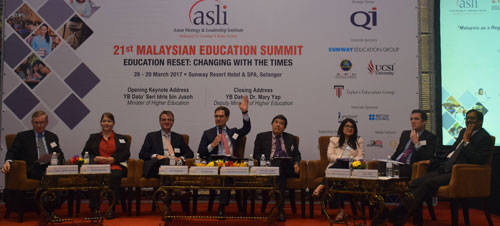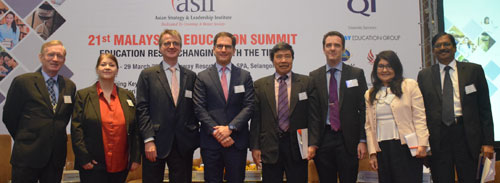
Tim Bulow (fourth from left) poses a question to the audience on international student experiences.
In the recent 21st Malaysian Education Summit organised by the Asian Strategy and Leadership Institute, Tim Bulow, CEO of INTI International University & Colleges alongside seven other leaders from the education industry discussed the hefty topic of Malaysia’s growth as a regional education hub. Among the critical issues discussed was the importance of raising Malaysia’s higher education brand at the international stage, the improvement of administrative services including the issuance of visas and licences, and ensuring that programmes offered addressed the long term employability of students and prepared them as the next generation of global leaders.
Commenting on the panel discussion, Bulow said, “Coming together as an industry to address these challenges is a significant step forward in building this shared vision of becoming a regional education hub. Malaysia’s quality of education and life coupled with its stability and affordability has already provided a solid foundation for growth. Our next steps is to assess where improvements are needed and collectively build toward positive graduate outcomes.”

Panellists from left to right – Craig Arden Sherrin, President of Taylor’s College; Susan Milner, Director of Education, South East Asia, British Council Malaysia; Guy Perring, Director of Client Services Asia, i-graduate International Insight; Professor Khong Kim Hoong, Deputy Vice Chancellor (Academic), HELP University; Professor Stephen Doughty, President & CEO, Penang Medical College; Tengku Azian Shariman, Executive Vice President, PEMANDU Associates; and Associate Professor Elajsolan Mohan, President of the National Association of Private Educational Institutions.
The forum, launched by YB Dato’ Seri Idris bin Jusoh, Minister of Higher Education, Malaysia, highlighted the need for change within Malaysia’s education system in aligning with 21st century needs. Beyond regional growth, the forum also addressed the integration of technology into education and the need for a change in perceptions towards today’s generation as co curators of knowledge rather than just students.